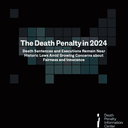The American Bar Association (ABA) renewed its call for a nationwide halt to executions following a series of state studies that found serious problems in their death penalty systems.
“After carefully studying the way states across the spectrum handle executions, it has become crystal clear that the process is deeply flawed. The death penalty system is rife with irregularity,” said Stephen F. Hanlon (pictured), chairman of the ABA Death Penalty Moratorium Implementation Project.
During the past three years, the ABA has issued death penalty assessment reports in eight states: Alabama, Arizona, Georgia, Florida, Indiana, Ohio, Pennsylvania, and Tennessee. The studies were conducted by independent teams of former judges, attorneys, and academic researchers. The reports revealed ways that each state failed to meet some of the basic standards established by the ABA to ensure fairness and to minimize the risk that innocent persons could be executed.
The ABA’s call for a nationwide moratorium on executions was contained in a press release accompanying their report detailing the findings of the state assessments. Among the key problems cited by the ABA were the following:
- Spotty collection and preservation of DNA evidence, which has been used to exonerate more than 200 people, including many who were on death row
- Misidentification by eyewitnesses
- False confessions from defendants
- Persistent racial disparities that make death sentences more likely when victims are white.
(Associated Press, October 29, 2007). Read the ABA State Assessment Reports. See also Studies, Innocence, Arbitrariness, Race, and Representation.



